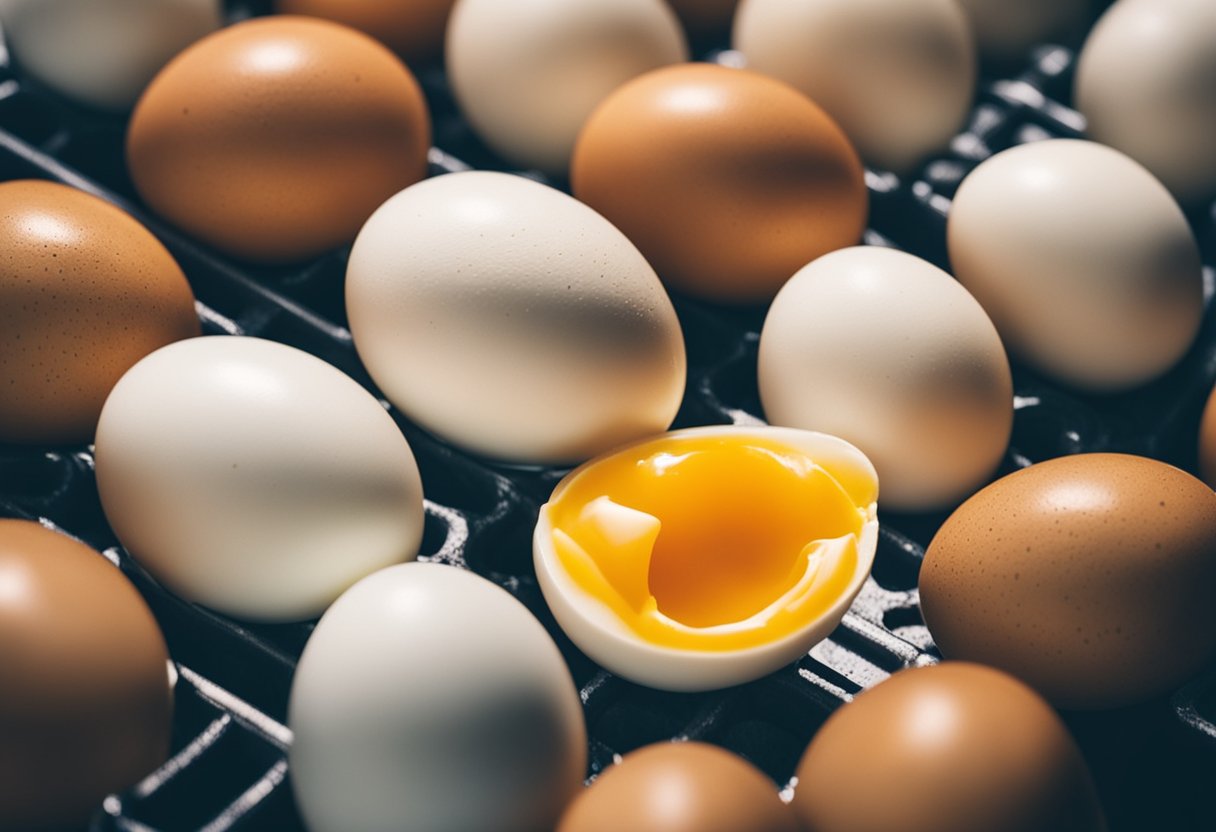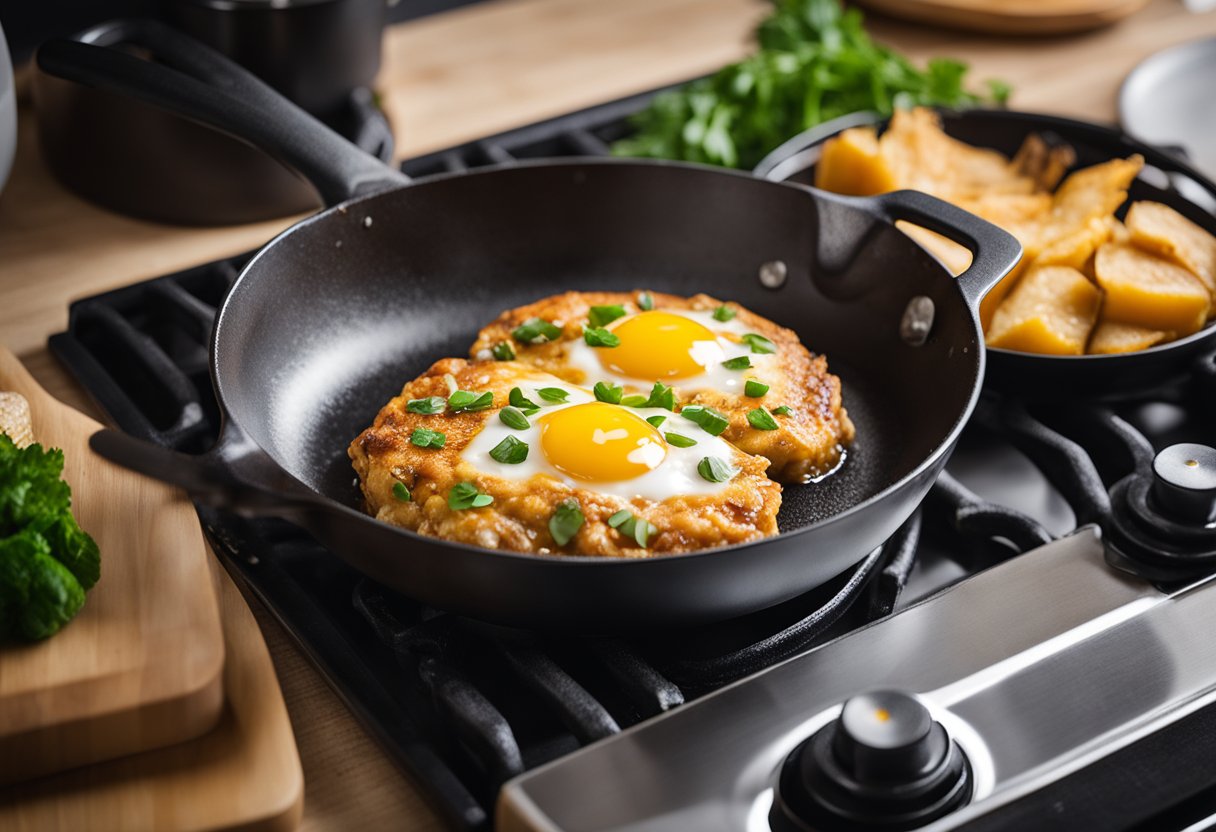Reheating boiled eggs is a simple task that can be done in a variety of ways. Whether you’re looking to enjoy a leftover boiled egg or want to meal prep for the week, reheating boiled eggs is a quick and easy process that can be done in just a few minutes.
In this article, I will cover the best methods for reheating boiled eggs, safety precautions to take, and tips for achieving the best results.

Before we dive into the methods for reheating boiled eggs, it’s important to understand the basics of boiled eggs. Boiled eggs are a nutritious and versatile food that can be enjoyed on their own or used in a variety of recipes.
When boiling eggs, it’s important to follow the proper cooking time to ensure that they are fully cooked and safe to eat.
Once boiled, eggs can be stored in the refrigerator for up to one week. Reheating boiled eggs is a great way to enjoy them again without having to start from scratch.
To prepare for reheating boiled eggs, it’s important to take a few steps to ensure that they are safe to eat and will reheat evenly.
This includes properly storing the boiled eggs, peeling them before reheating, and using the right method for reheating. By following these steps, you can enjoy a perfectly reheated boiled egg every time.
Key Takeaways
- Reheating boiled eggs is a quick and easy process that can be done in a variety of ways.
- To achieve the best results, it’s important to properly store the boiled eggs, peel them before reheating, and use the right method for reheating.
- By following these tips, you can enjoy a perfectly reheated boiled egg every time.
Understanding Boiled Eggs

Boiled eggs are a popular breakfast food that can be enjoyed in many different ways. They are easy to cook, and they can be eaten on their own or used as an ingredient in other dishes.
Boiled eggs are also a great source of protein and contain essential vitamins and minerals.
There are two types of boiled eggs: hard-boiled and soft-boiled. Hard-boiled eggs are cooked until the yolk is fully set, while soft-boiled eggs have a runny yolk.
The cooking time for each type of egg varies, and it is important to know how to cook them properly to achieve the desired result.
Hard-boiled eggs are a great source of protein, with one large egg containing around 6 grams of protein. They are also low in calories and contain essential vitamins and minerals such as vitamin D, vitamin B12, and iron.
The yolk of a hard-boiled egg is rich in nutrients, including choline, which is important for brain health.
Soft-boiled eggs are a popular breakfast food, and they are often served with toast or used as a topping for salads. They are also a great source of protein and contain essential vitamins and minerals.
The yolk of a soft-boiled egg is runny, making it a great addition to dishes such as ramen or bibimbap.
When reheating boiled eggs, it is important to do so properly to avoid overcooking them. Overcooked boiled eggs can become tough and rubbery, which can ruin the texture and flavor of the egg.
There are several methods for reheating boiled eggs, including using boiling water or a microwave.
In summary, boiled eggs are a great source of protein and essential nutrients. There are two types of boiled eggs, hard-boiled and soft-boiled, and they can be enjoyed in many different ways.
When reheating boiled eggs, it is important to do so properly to avoid overcooking them and ruining their texture and flavor.
Preparation Before Reheating

Before reheating boiled eggs, it is important to take certain steps to ensure that the eggs are safe to eat and will reheat properly. Here are some tips to help you prepare your boiled eggs for reheating:
Shell and Peel
If you have boiled eggs that are already peeled, you can skip this step. However, if your eggs are still in their shells, you should remove the shells before reheating them.
To do this, gently tap the egg on a hard surface to crack the shell, then carefully peel away the shell and discard it.
Store Properly
Boiled eggs should be stored in the refrigerator until you are ready to reheat them. If you have already peeled the eggs, store them in an airtight container to prevent them from drying out.
Bring to Room Temperature
Before reheating boiled eggs, it is best to let them come to room temperature. This will help prevent the eggs from cracking when they are reheated.
To do this, simply take the eggs out of the refrigerator and let them sit at room temperature for about 30 minutes.
Cover the Eggs
When reheating boiled eggs, it is important to cover them to prevent them from drying out or becoming rubbery. You can cover the eggs with a lid, plastic wrap, or a damp paper towel.
By following these simple steps, you can ensure that your boiled eggs are properly prepared for reheating. This will help you avoid any issues with the eggs cracking, drying out, or becoming rubbery when you reheat them.
Reheating Boiled Eggs: Methods
When it comes to reheating boiled eggs, there are several methods you can use depending on your preference and the equipment available. Here are some of the most common methods:
Microwave Method
The microwave method is the quickest and easiest way to reheat boiled eggs. Simply place the egg in a microwave-safe dish or bowl, and heat it for 30 seconds to 1 minute on high power.
Be sure to pierce the shell with a fork or knife before microwaving to prevent it from exploding. If the egg is still cold after the first round of heating, continue microwaving in 10-second intervals until it reaches the desired temperature.
Stovetop Method
The stovetop method involves boiling the eggs in water to reheat them. Fill a pot with enough water to cover the eggs and bring it to a boil.
Once the water is boiling, gently place the eggs into the pot using a slotted spoon or tongs. Boil the eggs for 1-2 minutes, then remove them from the pot and let them cool before peeling.
Oven Method
The oven method is another option for reheating boiled eggs. Preheat the oven to 350°F (175°C) and wrap the egg in aluminum foil.
Place the wrapped egg on a baking sheet and bake it for 10-15 minutes. Once it’s heated through, remove the egg from the oven and let it cool before peeling.
Steaming Method
Steaming is a gentle method of reheating boiled eggs that helps prevent overcooking. To steam the eggs, fill a pot with about an inch of water and bring it to a boil.
Place the eggs in a steamer basket or on a rack above the water and cover the pot with a lid. Steam the eggs for 5-7 minutes, then remove them from the pot and let them cool before peeling.
Frying Method
Frying boiled eggs is another option for reheating them, especially if you want to add some extra flavor. Melt a small amount of butter in a nonstick pan over medium heat and add the boiled egg.
Cook the egg for 1-2 minutes on each side until it’s heated through and slightly browned. You can also add bacon or other ingredients to the pan for a breakfast-style dish.
Using Leftovers in Recipes
If you have leftover boiled eggs, you can use them in a variety of recipes such as egg salad, deviled eggs, breakfast burritos, omelets, and quiches. Simply peel and chop the eggs and add them to your favorite recipe.
Overall, reheating boiled eggs is a simple process that can be done using several methods. Whether you prefer the speed of the microwave or the gentle steaming method, there’s a technique that will work for you.
Just be sure to follow the appropriate cooking time and safety precautions to ensure your eggs are reheated properly.
Safety Precautions During Reheating

When reheating boiled eggs, it is important to take safety precautions to prevent any hazards or foodborne illnesses. Here are some safety tips to keep in mind:
Use a Heat Proof Bowl
When reheating boiled eggs, make sure to use a heat-proof bowl that can withstand high temperatures. A glass or ceramic bowl is ideal.
Avoid using plastic or other materials that can melt or release harmful chemicals when exposed to heat.
Check the Temperature
To ensure that the boiled eggs are safe to eat, use a food thermometer to check the internal temperature. The temperature should reach at least 165°F (74°C) to kill any bacteria that might be present.
Avoid Overheating
Overheating boiled eggs can cause them to explode, which can be dangerous. To prevent this, do not heat the eggs for too long or at too high a temperature.
If using a microwave, heat the eggs in short intervals and check the temperature after each interval.
Watch for Moisture
Moisture can cause bacteria growth, which can lead to foodborne illness. When reheating boiled eggs, make sure to remove any excess moisture from the bowl or plate.
Be Aware of Salmonella
Salmonella is a common bacteria that can cause food poisoning. To avoid the risk of salmonella, make sure to handle the boiled eggs properly and store them in the refrigerator until ready to reheat.
Practice Good Food Safety
Finally, always practice good food safety habits when handling and reheating boiled eggs. Wash your hands before and after handling the eggs, and avoid cross-contamination by using separate utensils and cutting boards for raw and cooked foods.
By following these safety precautions, you can enjoy reheated boiled eggs without any risk of foodborne illness.
Effects of Reheating on Quality

Reheating boiled eggs can affect their texture, taste, and overall quality. The effects of reheating boiled eggs depend on several factors, including how the eggs were cooked, how they were stored, and how they are reheated.
When boiled eggs are reheated, they can become rubbery or overcooked, which can affect their texture and taste. This is especially true for scrambled eggs, which can become dry and lose their flavor when reheated.
Additionally, reheating boiled eggs can cause them to explode or crack, which can be messy and potentially dangerous.
Reheating boiled eggs can also affect their freshness and increase the risk of bacterial growth. To reduce this risk, it is important to store boiled eggs properly and to reheat them thoroughly to kill any bacteria that may have grown.
Soft boiled eggs are particularly sensitive to reheating, as they can easily become overcooked and lose their runny yolk.
To reheat soft boiled eggs, it is best to place them in boiling water for a short period of time to warm them up without overcooking them.
Overall, reheating boiled eggs can be a convenient way to enjoy leftover eggs, but it is important to do so properly to maintain their quality and safety.
Tips for Best Results
When it comes to reheating boiled eggs, there are a few tips that can help you achieve the best results. Here are some guidelines that I follow to ensure that my reheated boiled eggs are tasty and safe to eat.
Use the Safest Way to Reheat Boiled Eggs
The safest way to reheat boiled eggs is to submerge them in boiling water for 10 minutes. This method warms the egg without cooking it further, so it’s great for hard and soft-boiled eggs.
According to Pantry & Larder, this method is the most effective way to reheat boiled eggs without compromising their texture and flavor.
Follow These Guidelines
When reheating boiled eggs, it’s important to follow these guidelines to ensure that they are safe to eat:
- Always use clean utensils and equipment when handling boiled eggs.
- Make sure that the eggs are fully submerged in the boiling water to prevent any bacteria from growing.
- Do not reheat boiled eggs more than once.
- If the boiled eggs have been sitting at room temperature for more than two hours, discard them.
Reheating Scrambled Eggs
If you have leftover scrambled eggs, you can reheat them in a non-stick pan over low heat. Add a splash of milk or water to prevent the eggs from drying out. Stir constantly until the eggs are heated through.
Versatility and Convenience
Boiled eggs are a versatile ingredient that can be used in a variety of breakfast and meal recipes. They are easy to prepare and can be stored in the refrigerator for up to one week.
To save time, you can boil a batch of eggs at the beginning of the week and use them throughout the week for quick and easy meals.
Incorporate Vegetables
To make your reheated boiled eggs more nutritious and flavorful, you can incorporate vegetables such as spinach, tomatoes, or mushrooms.
Simply sauté the vegetables in a non-stick pan and add the reheated boiled eggs for a quick and healthy breakfast or meal.
By following these tips, you can enjoy delicious and safe reheated boiled eggs that are perfect for any meal.
Frequently Asked Questions
Can boiled eggs be reheated in an air fryer?
Yes, boiled eggs can be reheated in an air fryer. However, it’s important to remove the shell first and then place the eggs in the air fryer basket. Set the temperature to 250°F and cook for 5-7 minutes until the eggs are heated through.
Is it safe to eat cold boiled eggs?
Yes, it is safe to eat cold boiled eggs. However, they may not be as flavorful or enjoyable as when they are warm. It’s important to store boiled eggs properly in the refrigerator and consume them within a week.
Can boiled eggs be reheated in a microwave without the shell?
Yes, boiled eggs can be reheated in a microwave without the shell. It’s important to slice the egg in half and place it in a microwave-safe dish.
Cover the dish with a microwave-safe lid or plastic wrap and heat on medium power for 30 seconds at a time until the egg is heated through.
What is the best way to reheat hard-boiled eggs?
The best way to reheat hard-boiled eggs is to place them in a pot of boiling water for 10 minutes. This method will warm the egg without cooking it any further.
Alternatively, you can place the egg in a bowl of hot water for a few minutes until it’s heated through.
How do you reheat boiled eggs in the oven?
To reheat boiled eggs in the oven, preheat the oven to 350°F. Place the eggs in a baking dish and cover with aluminum foil. Bake for 10-15 minutes until the eggs are heated through.
How do you warm up soft-boiled eggs?
To warm up soft-boiled eggs, bring a pot of water to a boil. Once the water is boiling, turn off the heat and place the eggs in the pot for 1-2 minutes.
Remove the eggs from the pot and run them under cold water to stop the cooking process.







